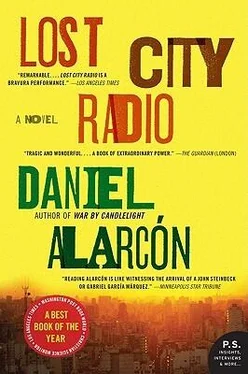“I’m a journalist, sir.”
“I hate journalists,” Rosquelles said. “You make excuses for these killers.”
“No one is making excuses for them anymore,” Elmer said. “The war is over.”
“It’s not over in there,” the official said.
“Yes, sir.”
“How many prisoners are there?” Norma asked.
Rosquelles shrugged. “We quit counting years ago. It’s a steady population now. No more growth. We don’t take prisoners anymore.”
“I see,” said Norma.
“We kill them first.”
“I see,” she repeated.
He stood up. From a cabinet, Rosquelles removed a bottle of rubbing alcohol and a bag of cotton balls. He opened the bottle, soaked a cotton ball, and passed it to Norma. He pointed at her forearm. “You don’t need those anymore. You’re with me.”
She hesitated.
“Take it,” the official said. “You might as well clean it now. The kids outside will charge you fifty cents.”
When they had finished, Rosquelles led the way with a jangling of keys, out of the office, along a dark corridor, then up a spiral staircase into a system of fenced-in raised causeways above the prison proper. They walked above the yard, along its perimeter: from this height, Norma could see the ocher mountains dotted with shanties, and below her, the prisoners standing in the dusty yard, staring back at her. A group of men were being led in stretching exercises by a fellow prisoner, others seemed to be debating among themselves. Some looked up in disgust, others with calm disinterest. The sun was bright, and they squinted up at the visitors. There were whistles and catcalls at Norma; she was a woman, after all, in a community of caged men. Some followed her, swarming and clamoring in the yard below, kicking up clouds of yellow earth, laughing. “Baby,” they called, and they said other things as well: about her pussy and the taste of it, about what they would do to her. Norma reached instinctively for Elmer’s hand, and he gave it to her. She didn’t feel safe. The causeway groaned with each step, and she imagined the entire structure collapsing, depositing her on the prison yard to be devoured. No one could save her, not with a knife or a gun or an army. Rosquelles ran his keys against the chain-link sides of the causeway. His graying hair was oily, and the back of his neck glistened. Periodically, he spat through the fence on the prisoners.
There were others, Rosquelles explained, locked in cells below the ground in lightless, stiflingly hot tombs. “These,” he said, motioning over the yard, “these are the good ones.”
“Can we see them?” Elmer asked. “The others?”
Rosquelles shook his head. The others were the ones who had shaken the country to its core. Out here were the soldiers, the triggermen. The leaders were below the ground, held incommunicado, only dimly aware that the war had ended, that they had lost. “Are you looking for someone in particular?”
“Yes,” said Norma, at the exact moment that Elmer said, “No.”
Rosquelles smiled. “Well, which is it?”
“My husband,” Norma said. “There was a mistake.”
A steady group of men had tracked the visitors’ progress around the yard, but most had given up trying to elicit any response at all, had broken off. A few sat on their haunches, smoking and spitting. The sun glowed brightly, and Norma felt faint. She coiled her fingers around the chain-link fence, steadying herself.
A prisoner invited Norma to sit on his face.
“Animal!” Rosquelles shouted. He turned to Norma. “I’m sorry, madam. We don’t make mistakes.”
The prisoners responded with curses and laughter, and they called him by name. “Rosquelles!” they called. “Killer! Is that your girlfriend?”
He frowned. “You have fans,” Rosquelles said. “This is no place for a woman. Are you well?”
Norma nodded. “May we see the lists?”
“There are no lists,” he said.
They continued around the causeway above the yard. The men below were unshaven and dirty, shirtless and sunburned. The elevated metal corridor opened every fifty meters into a watchtower. Rosquelles greeted each guard the same way—“Friendlies behind!” Still, the young guards had fear in their eyes, and they kept their guns trained on Norma and Elmer until they had walked past.
Rosquelles led them to the observation tower, the highest one, two flights of stairs above the causeway. There were two soldiers inside and an imposing array of weapons trained on the prisoners below. Norma peered out: from this distance, the imprisoned men moved like ants, a dizzying and chaotic display. She studied them through binoculars: their faces, the lines of their jaws, their brows, and saw nothing and no one who could be her husband. He would recognize her, wouldn’t he? And he would call out to her? But he wasn’t there. She’d known it, of course, but hadn’t allowed herself to think too much. What options were there? He’d been near the battle. There were prisoners and there were dead: wouldn’t it be better to find him here, locked up among the warriors? Or was he a leader, entombed below?
No one had ever accused him of such a thing.
Maybe they saw her watching them. Maybe it was their way of mocking her interest. The buzzing crowd fell apart and regrouped in straight lines, row after row of thin, dark men. “Killers!” they chanted. They were fearless. Some smiled.
Norma turned away, stared into the mountains. Without the shanties, it could be a postcard.
Rosquelles shook his head. “They’re going to sing.”
Where before there was confusion, now there was order. Were these the same men who had chased them around the yard, the same feral pack of sun-scarred, hungry prisoners? A murmuring rose from below, a scratch of a melody, nothing more. There was a code at work, the men held their arms at their sides, statuesque and military. What could Rey be doing here, if he was? They were less than human, they puffed their chests and stood straight, and their faces were stern now. They were cogs of a machine. They sang.
“Is the IL real?” Norma asked. She could think of nothing else.
Rosquelles looked at her, disbelieving. He turned to Elmer. “Who is she?”
“I’m sorry,” Norma said. “It’s just that—”
“Why don’t you ask them?” Rosquelles said, waving his hand at the prisoners below.
“What about the Moon? Are there still people there?”
“Woman, are you mad?”
Norma said nothing. She closed her eyes and listened as Elmer apologized on her behalf. Her Rey wandered the jungle and inhaled the soggy odors of the forest, he loved birds and verdure and the smell of wood smoke. He was not IL, because he told her he wasn’t. He’d said those words, hadn’t he? He wasn’t IL, because the IL did not exist.
“Why are we here?” Norma whispered.
Elmer blinked his eyes. “You wanted to do this.”
“Fire a warning shot,” Rosquelles said to the guard.
The guard aimed at the ground in front of the prisoners and let off a few shots. Dust bloomed in tiny mushroom caps. The men kept singing. Norma looked over her shoulder at Elmer, and he shrugged when he met her gaze. The bullets kept coming at regular intervals, advancing toward the line of men. They sang, and Rosquelles cursed. There was something mechanical about them, something terrifyingly disciplined. The war planners hadn’t counted on that mania. It had been the key to their success. The country’s history was dotted with guerrilla episodes of varying intensities: here and there, a ragtag militia fired by an empty ideology or a provincial grievance, a lightly armed band led by a quixotic upper-crust dropout — it happened all the time, twice a generation, and ended the same way: the insurgents marched themselves to starvation, were felled by malarial fevers. They played at war on the fringes of the nation-state, then gave up as soon as the shooting began. The IL had been different. They didn’t give up. They began the war and never planned for a truce. They wanted everything.
Читать дальше












